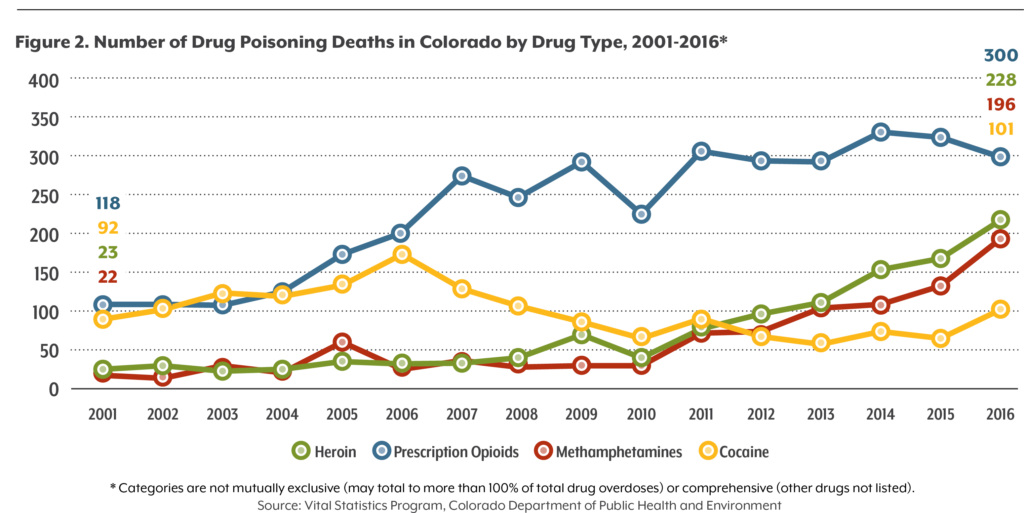In Colorado, you are now more likely to die of a drug overdose than in a car crash. If that statistic is shocking, you’re not the only one outraged. In an apparent response to public outcry, the Colorado Attorney General’s office made waves in recent days, filing suit against Purdue Pharma for its aggressive marketing of their OxyContin opioid. The complaint, filed Thursday, alleges that Purdue misrepresented the addiction potential of the drug and overstated its efficacy. It even claims Purdue invented the fake term “pseudoaddiction syndrome” to mislead the public and flood the market with its opioid drugs.
Colorado is not the first state to file suit against Purdue. It joins the ranks of North Carolina and New Jersey in doing so. Purdue has already denied the claims made against it in the suit. The Attorney General’s office alleges that the pharmaceutical giant lied to doctors when marketing OxyContin by telling them that addiction could be avoided, and that it told doctors who did not wish to market the drug that they were “violating the Hippocratic Oath and failing their patients.”
In a press release, the Attorney General said Purdue’s “corporate focus on making money took precedence over patients’ long-term health,” and that the company cost Coloradoans their lives with “intentional misconduct.”
Dishonest Practices by Big Pharma
For decades, Purdue has aggressively marketed their opioid painkillers. Now, amid a tidal wave of bad press, they have responded with promises to do better. So many promises, in fact, that the first page of a Google search for “Purdue Pharma opioid crisis” exclusively returns results from their official website, effectively burying other reporting on the topic. But this year, the New York Times reported that Purdue knew its drugs were being widely abused as early as 1996. More than 100 internal sales memos recording visits to medical practitioners and doctors used the words “street value,” “crush,” or “snort.”
By all allegations, encouraging doctors to overprescribe their OxyContin and MS Contin products was Purdue’s preferred tactic. Early advertisements from the company depicted a supposed doctor saying, “The rate of addiction among pain patients who are treated by doctors are less than one percent… These drugs, which I repeat are our best and strongest pain medications, should be used much more than they are.” Even after studies had been published which demonstrated OxyContin’s high abuse potential, Purdue sales representatives described being given earlier, less scientific surveys claiming the contrary.
Colorado Governor John Hickenlooper joined the Attorney General in saying, “Purdue failed in its responsibility to ensure that consumers understood the risks associated with their products.”
Its coining of the term “pseudoaddiction” is among the more manically ingenious things alleged against the pharmaceutical giant. Purdue supposedly told doctors that patients complaining of physical addiction to OxyContin were, in fact, delusional. They claimed that these patients simply weren’t being given strong enough opioids (or being given them often enough) to fully treat pain. They claimed, in effect, that the solution to opioid-addicted patients was to give them more opioids. A 2015 study from the National Institute of Health found that there was no empirical evidence to suggest the existence of pseudoaddiction and insinuated that the use of the term may have contributed to the opioid addiction epidemic.
By the numbers: Colorado’s lethal opioid crisis
There were 69.8 opioid prescriptions written for every 100 Colorado residents in 2013. That’s nearly 4 million prescriptions in total. Prescription opioid deaths have outmatched and risen at a higher rate than deaths from either heroin or methamphetamine, according to the Colorado Department of Health and Environment. In 2016, the death toll reached 912, with 504 as a result of opioids, and experts say it would be as much as twenty-five percent higher if the drugs involved in every overdose could be accounted for.
All of Colorado has been affected, but the worst rates of overdose have been in El Paso, Fremont, Pueblo, Huerfano, and Las Animas counties. Each year, a different county claims the tragic prize of experiencing more than fifty overdose deaths within its borders.

Colorado says: Hit big pharma where it hurts
Colorado is fighting back against the predatory practices of Purdue Pharma, and so can you. Innocent lives are swept up by the opioid crisis every day, not of their own accord, but because they were lied to about the nature of their pain medication—medication which turned out to be as deadly or life-afflicting as any street drug. Purdue may have made billions from a medical crisis of their own creation, but enough is enough. As Coloradoans, we’ve seen the damage done in real time.
If you or someone you love has been affected by or lost their life to prescription opioids, you may feel helpless to fight the injustice wrought on you. Pharmaceutical companies must be held accountable for the ills their products can impose on communities and individuals. In an environment that favors profit over people, these companies often take advantage by spreading misinformation and are alleged to encourage debilitating and deadly abuse of their drugs. You may be entitled to compensation for your or a loved one’s losses. At Porya Mansorian and Associates, we are dedicated to representing your best interests in these cases. Contact us today by calling our office or by filling out the form on this page.

